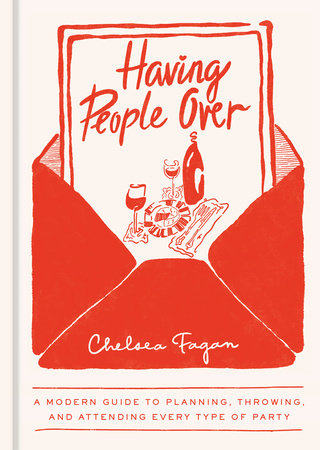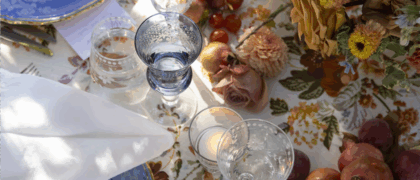IntroductionLetter from ChelseaDear Hostess,
For as long as I can remember, my family’s house was the party house. More weekends than not, people gathered at our home for all kinds of celebrations: dinner parties, theme parties, poker parties, and countless other mini-events. As the guests began to arrive, my parents would implore my sister and me to greet them, maybe share a charming anecdote from school, before banishing us to their bedroom, where we’d enjoy the snacks and movie rental with which they’d bribed us. As long as we didn’t disturb anyone, we could stay up as late as we wanted, bouncing on the bed while the din of laughter wafted up toward us, eventually lulling us to sleep.
I remember the ritual of it: the days spent preparing dishes and decorations and the near-endless cleaning, even of spaces guests would never see. In some ways, our lives revolved around this constant expanding and contracting of our home, the buzzing promise of visitors turning our space into a kind of living entity. And life never felt more complete than when the house was full of lively music and the sound of people filling their plates.
My mother was always head chef and chair of the decorations committee in our home, with the rest of us following her vision (these days, my mother favors a subdued interior palette of creams, dark browns, and brass finishes). And to this day, my father is happy to play executive assistant. When you’re a guest in their home, he is still her biggest hype man, drawing your attention to something she did particularly well.
“Isn’t that dip amazing?” he’ll say, handing you a drink perched on a cocktail napkin.
“It was so hard not to eat the whole thing before you arrived.” Especially in the early days of my childhood, when money was very tight, my mother’s unique talent for making something of nothing wasn’t just what lit up their parties: It was what kept our lives from feeling as difficult as they actually were. We were often rolling quarters to pay the bills, but homemade food for parties and handmade costumes on Halloween made the limitations feel like creative exercises.
Although the spaces I’ve lived in through my own adult life share little with the homes I grew up in, I’m proud to say that I’ve kept the tradition of entertaining at the center of my solar system. In a given week, my husband Marc and I will host at least one gathering, and we’ve selected a group of friends who love to entertain as much as we do.
Don’t get me wrong: I relish a good restaurant or a night out dancing, the see-and-be-seen exhilaration of being in a crowd. But there is something so beautiful about welcoming people into your home, taking time to prepare an experience for them, and sharing the intimate, beautiful tedium of your life. Whether a raucous cocktail party that spans social groups or a cheeky grown-up slumber party with one of my favorite women, hosting is the center of my life.
Of course, even if there were no greater significance to the act of hosting, I would still love doing it: Having people over is incredibly fun. But I would argue that, in a culture that is increasingly estranged from itself, with communities fraying at the edges, gathering is an important act. We can get into the sociopolitical details later, but suffice it to say that bringing people together is one of the most powerful things we can do right now. We were meant to be a village, and that village was meant to gather in the home.
Rarely is this clearer to me than when I consider my relationship to those in my life with children. I decided long ago that parenthood was not for me—a choice that often results in people warning me of the dire lack of community I’ll experience as I age. But so far, I’ve found the opposite is true: I have plentiful energy to connect with the mothers in my life and delight in the opportunity to have kids around. Bringing new moms food and gift baskets, hosting them for casual gatherings where they’re welcome to bring the whole family, creating events where mothers and non-mothers alike can mingle at their own pace: I love being a part of the experience in my own small way, being intentional about the community I create. Cultivating a space that opens its doors to people in all stages of life is one of the most essential human activities.
I also believe hosting is uniquely adaptable to all different budgets, in a way that few things today are. Looking back, a big part of the reason my parents defaulted to hosting at home was because of its affordability. And as someone who has staked most of her career on financial transparency and education, and on the realities of going from low income to a much more comfortable tax bracket, I can honestly say that entertaining is something I’ve been able to do at every income level. I hosted potlucks and movie nights when I was at my most broke—sometimes relying on them to stock me with leftovers for the week to come—and now I throw lavish gatherings for friends and family, because nothing is more worthy of disposable income than sharing it with others.
While I cannot promise that every single idea or tip in this book will be relevant to everyone, I
can promise that the vast majority can be implemented across the financial spectrum. Being a good host is about making people feel welcome, about creating moments that feel special and intentional—and so much of that has nothing to do with money. The entire point of reframing your social life in this way is to unlearn the idea that you need extravagant (and expensive) nights out to solidify a friendship or feel like you’re getting the most out of life.
Similarly, I want to posit the (perhaps radical) idea that becoming a hostess is about deciding that your platonic relationships are just as important as your romantic or familial ones. I
love my friends—meaningfully, enthusiastically, joyously—and welcoming them into my home is an important way to demonstrate and reinforce that. Much of what we will talk about in this book is the art of maintaining and strengthening relationships even as our lives change, when we don’t have the effortless convenience of school or work to bring us together.
This book will also examine what it means to be a good guest, because showing up as our best selves is just as important as welcoming others into our spaces. What to bring, when to arrive, the thank-yous and follow-ups that make a host feel appreciated—they are all important.
There are few more wonderful things in life than being the kind of person others want to invite over, the person whose presence lights up a party or makes the host’s life that much easier. Hosting is about giving in many ways, but it is also about receiving, and learning to be an ideal guest ensures that you’re always holding up your end of the bargain.
I think often about what my childhood home was like during party nights, how so many small efforts accumulated to create an experience that seemed totally effortless. There was a warmth on those evenings, an invisible electricity that buzzed and hummed among all the guests and rose all the way upstairs, even as my sister and I were removed from the thick of things. It is that electricity I strive for, the moment just before the party is at its peak, when everyone is engaged in great conversation, feeling unusually attractive and charming, buzzed as much from the magic of the moment as from anything they might have imbibed.
For those who did not grow up learning how to build these moments—how to create a home for entertaining, how to properly stock a kitchen, what recipes to make, how to curate the flow of an evening, et cetera—I understand that it can all seem intimidating. It can also seem overwhelming, because there are so many little things you could overlook or do imperfectly. But I can promise that the smallest effort goes a long way, especially in our culture, which has largely forgotten the art of hosting. Taking the time to arrange a few things on a tray, to set up a beverage station, to ask in advance about dietary needs and actually accommodate them, to curate a playlist for the evening: These small touches are all easy to pull off, and range from “free” to “very inexpensive.” And when they are done well and with intention, your guests will be blown away at the seamlessness of the evening.
Being a true hostess isn’t complicated or expensive. It is simply the act of treating the people who come into your home with care and celebrating the moments you’re lucky enough to share with them.
Everything else is just decoration.
Chelsea
Copyright © 2025 by Chelsea Fagan. All rights reserved. No part of this excerpt may be reproduced or reprinted without permission in writing from the publisher.














